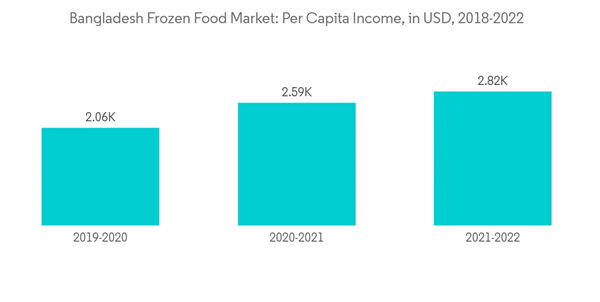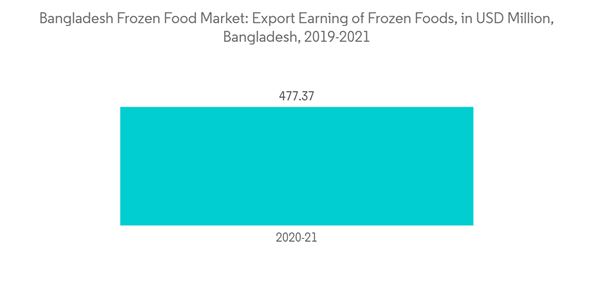Fast-paced urban life, rising disposable incomes, an increase in the number of women in the workforce, resulting in a lack of time, and a preference for nuclear families are all significant reasons for Bangladeshi consumers' growing acceptance of frozen food.In addition, factors include rising disposable income in the country, the introduction of longer shelf-life products, increasing impulse purchasing, and a massive demand for frozen food products due to a lack of time. The frozen food market in Bangladesh is being driven by urban consumers who have been exposing themselves to similar products in quick-service restaurants (QSRs), food stalls, and kiosks, among others. Furthermore, the growing availability of traditional favorites in frozen formats has attracted a growing consumer base over the past few years, thereby driving the growth of the market over the review period.
Furthermore, changing consumer lifestyles have created numerous opportunities for manufacturers across industries. The increasing at-home socializing has led to the growing acceptance of western food across Bangladesh, thereby enabling the need for on-the-go foods and, in turn, enhancing the demand for frozen foods, including ready-to-eat and ready-to-cook products altogether, in turn driving the market.
Bangladesh Frozen Food Market Trends
Surge in Demand for Ready-to-Eat and Ready-to-Cook Food and Beverage Products
In the last few years, Bangladesh has seen a sharp increase in demand for frozen foods. The rise in demand for frozen foods in the region has been attributed to the rise in popularity of convenience food and beverage products, owing to busy lifestyles and the number of working citizens in Bangladesh. Furthermore, Bangladeshi consumers have been looking for easy-to-prepare international cuisines. The changing food consumption pattern of consumers, due to the rapid expansion of urbanization and the rise in disposable incomes in the country, is one of the factors contributing to the growth of ready-to-eat food and beverage products. As frozen food is typically frozen at a very low temperature, which destroys microorganisms and limits the amount of oxidation that may happen, it is generally perceived to be healthier than fresh food to some extent. Furthermore, freezing slows down or inhibits the growth of fungi, which might reduce the chances of food poisoning. Young consumers spend most of their income on convenient, ready-to-eat food products. The largest producers of ready-to-eat food find it easier to target young consumers. Frozen food products are considered the closest substitute for conventional food, which may be consumed whenever it is convenient (such as during breakfast, lunch, or dinner).Owing to the increased demand for frozen food, leading companies like Golden Harvest, Pran, and others are opting for the expansion strategy to expand their market presence and consumer bases. For instance, in 2021, Eon Foods Limited launched the renowned Canadian brand 'McCain' to reach the doorsteps of Bangladeshi consumers. Eon Foods is going to start marketing 'McCain' in Bangladesh to reach out to consumers by maintaining a proper cold chain. Frozen fruit and vegetable products are perceived as healthy by local consumers as they contain more nutrients than preserved food products.
Increasing Consumer Acceptance of Frozen Food
The frozen or convenience food industry, which started by offering essential frozen vegetables and fries, today provides a wide range of snack products, ranging from vegetarian snacks and vegan snack items to frozen meats and ready-to-cook products. With increasing customer appetite and acceptance, the frozen snacks market has recorded a healthy growth rate, complemented by an increase in selling points, deeper penetration by organized retail players, and increased freezer space in retail channels. In response to the increased demand for frozen products, Bangladesh has increased its production, distribution, and exports of frozen food. The frozen food industry has taken over the fifth spot in export trade as an entirely value-added product. The country's principal product was frozen shrimp in 2020-21. In the fiscal year 2020-21, frozen foods export revenue totaled USD 477.37 million, a 4.65% increase over the USD 456.15 million earned in the previous fiscal year. Frozen food exports accounted for 1.23% of the country's overall export revenue in 2020-21. The United States, the United Kingdom, Belgium, the Netherlands, and Germany are the top five markets for frozen food exports from Bangladesh.Bangladesh Frozen Food Market Competitor Analysis
The Bangladeshi frozen food market is consolidated, owing to the absence of numerous local and international players. The raw material suppliers are farmers or middlemen who transfer farm supplies to the frozen food manufacturers. Some of the prominent players in the country include Golden Harvest, Pran RFL Group, AG Foods Ltd., Frozen Foods Ltd., Kazi Farms Group, McCain Foods, Royal Frozen Foods, Savar Dairy & Poultry, Eurasia Food Processing (BD) Ltd., and Apex Foods Limited (AFL), among others.Additional benefits of purchasing the report:
- The market estimate (ME) sheet in Excel format
- 3 months of analyst support
This product will be delivered within 2 business days.
Table of Contents
Companies Mentioned (Partial List)
A selection of companies mentioned in this report includes, but is not limited to:
- Golden Harvest Agro Industries Ltd
- Pran-Rfl Group Ltd
- McCain Foods
- Ag Foods Ltd
- Frozen Foods Ltd
- Royal Frozen Foods
- Eurasia Food Processing (BD) Ltd
- Apex Foods Limited (AFL)
- Kazi Farms Group
- Taufika Group
- LENK Frozen Foods










